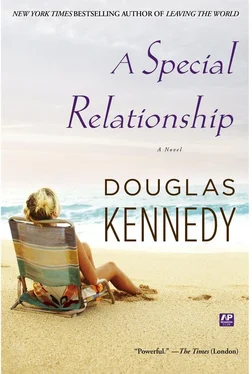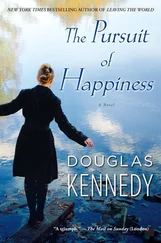And then the chopper did another roll and the Brit was tossed away from the window, but managed to latch on to his nearby straps and avoid being hurled across the cabin.
'You okay?' I asked.
Another of his smiles. 'I am now', he said.
A further three stomach-churning rolls to the right, followed by one more rapid acceleration, and we seemed to leave the danger zone. Ten nervous minutes followed, then we banked low. I craned my neck, looked out the window and sucked in my breath. There before me was a submerged landscape - Noah's Flood. The water had consumed everything. Houses and livestock floated by. Then I spied the first dead body - face down in the water, followed by four more bodies, two of which were so small that, even from the air, I was certain they were children.
Everyone in the chopper was now peering out the window, taking in the extent of the calamity. The chopper banked again, pulling away from the nucleus and coming in fast over higher ground. Up in the distance, I could see a cluster of jeeps and military vehicles. Closer inspection showed that we were trying to land amidst the chaos of a Somalian Army encampment, with several dozen soldiers milling around the clapped-out military equipment spread across the field. In the near-distance, we could see three white jeeps flying the Red Cross flag. There were around fourteen aid workers standing by the jeeps, frantically waving to us. There was a problem, however. A cluster of Somalian soldiers was positioned within a hundred yards of the Red Cross team - and they were simultaneously making beckoning gestures towards us with their arms.
'This should be amusing', the Brit said.
'Not if it's like last time', one of the Red Cross team said.
'What happened last time?' I asked.
'They tried to loot us', he said.
'That happened a lot back in '97 too', the Brit said.
'You were here in '97?' I asked him.
'Oh yes', he said, flashing me another smile. 'A delightful spot, Somalia. Especially under water'.
We overflew the soldiers and the Red Cross jeeps. But the aid workers on the ground seemed to know the game we were playing, as they jumped into the jeeps, reversed direction, and started racing towards the empty terrain where we were coming down. I glanced over at the Brit. He had his binoculars pressed against the window, that sardonic smile of his growing broader by the nanosecond.
'Looks like there's going to be a little race to meet us', he said.
I peered out my window and saw a dozen Somalian soldiers running in our general direction.
'See what you mean', I shouted back to him as we landed with a bump.
With terra firma beneath us, the Red Cross man next to me was on his feet, yanking up the lever which kept the cabin door in its place. The others headed toward the cargo bay at the rear of the cabin, undoing the webbing that held in the crates of medical supplies and dried food.
'Need a hand?' the Brit asked one of the Red Cross guys.
'We'll be fine', he said. 'But you better get moving before the Army shows up'.
'Where's the nearest village?'
'It was about a kilometre due south of here. But it's not there anymore'.
'Right', he said. Then he turned to me and asked, 'You coming?'
I nodded, but then turned back to the Red Cross man and asked, 'What are you going to do about the soldiers?'
'What we usually do. Stall them while the pilot radios the Somalian central command - if you can call it that - and orders some officer over here to get them off our backs. But you both better get out of here now. The soldiers really don't see the point of journalists'.
'We're gone', I said. 'Thanks for the lift'.
The Brit and I headed out of the cabin. As soon as we hit the ground, he tapped me on the shoulder and pointed towards the three Red Cross jeeps. Crouching low, we ran in their direction, not looking back until we were behind them. This turned out to be a strategically smart move, as we had managed to dodge the attention of the Somalian soldiers, who had now surrounded the chopper. Four of them had their guns trained on the Red Cross team. One of the soldiers started shouting at the aid workers - but they didn't seem flustered at all, and began the 'stalling for time' gambit. Though I couldn't hear much over the din of the rotor motor, it was clear that the Red Cross guys had played this dangerous game before, and knew exactly what to do. The Brit nudged me with his elbow.
'See that clump of trees over there', he said, pointing towards a small patch of gum trees around fifty yards from us.
I nodded. After one fast final glance at the soldiers - now ripping into a case of medical supplies - we made a dash for it. It couldn't have taken more than twenty seconds to cover the fifty yards, but God did it seem long. I knew that, if the soldiers saw two figures running for cover, their natural reaction would be to shoot us down. When we reached the woods, we ducked behind a tree. Neither of us was winded - but when I looked at the Brit, I caught the briefest flicker of adrenalin-fuelled tension in his eyes. Once he realized that I'd glimpsed it, he immediately turned on his sardonic smile.
'Well done', he whispered. 'Think you can make it over there without getting shot?'
I looked in the direction he was pointing - another meagre grove of trees that fronted the now-deluged river. I met his challenging smile. 'I never get shot', I said. Then we ran out of the trees, making a manic beeline for the next patch of cover. This run took around a minute - during which time the world went silent, and all I could hear were my feet scything through the high grass. I was genuinely tense. But like that moment in the helicopter when we first came under fire, I tried to concentrate on something abstract like my breathing. The Brit was ahead of me. But as soon as he reached the trees, something brought him to a sudden halt. I stopped in my tracks as I saw him walking backwards, his arms held high in the air. Emerging from the trees was a young Somalian soldier. He couldn't have been more than fifteen. His rifle was trained on the Brit, who was quietly attempting to talk his way out of this situation. Suddenly the soldier saw me - and when he turned his gun on me, I made a desperate error of judgment. Instead of immediately acting submissive - coming to a complete halt, putting my hands above my head, and making no sudden movements (as I had been trained to do) - I hit the ground, certain he was going to fire at me. This caused him to roar at me, as he now tried to get me in his sights. Then, suddenly, the Brit tackled him, knocking him to the ground. I was now back on my feet, running towards the scene. The Brit swung a clenched fist, slamming it into the soldier's stomach, knocking the wind out of him. The kid groaned, and the Brit brought his boot down hard on the hand that was clutching the gun. The kid screamed.
'Let go of the gun', the Brit demanded.
'Fuck you', the kid yelled. So the Brit brought his boot down even harder. This time the soldier released the weapon, which the Brit quickly scooped up and had trained on the soldier in a matter of seconds.
'I hate impoliteness', the Brit said, cocking the rifle.
The kid now began to sob, curling up into a foetal position, pleading for his life. I turned to the Brit and said, 'You can't...'
But he just looked at me and winked. Then, turning back to the child soldier, he said, 'Did you hear my friend? She doesn't want me to shoot you'.
The kid said nothing. He just curled himself tighter into a ball, crying like the frightened child he was.
'I think you should apologize to her, don't you?' said the Brit. I could see the gun trembling in his hands.
'Sorry, sorry, sorry', the kid said, the words choked with sobs. The Brit looked at me.
'Apology accepted?' he asked. I nodded.
Читать дальше












